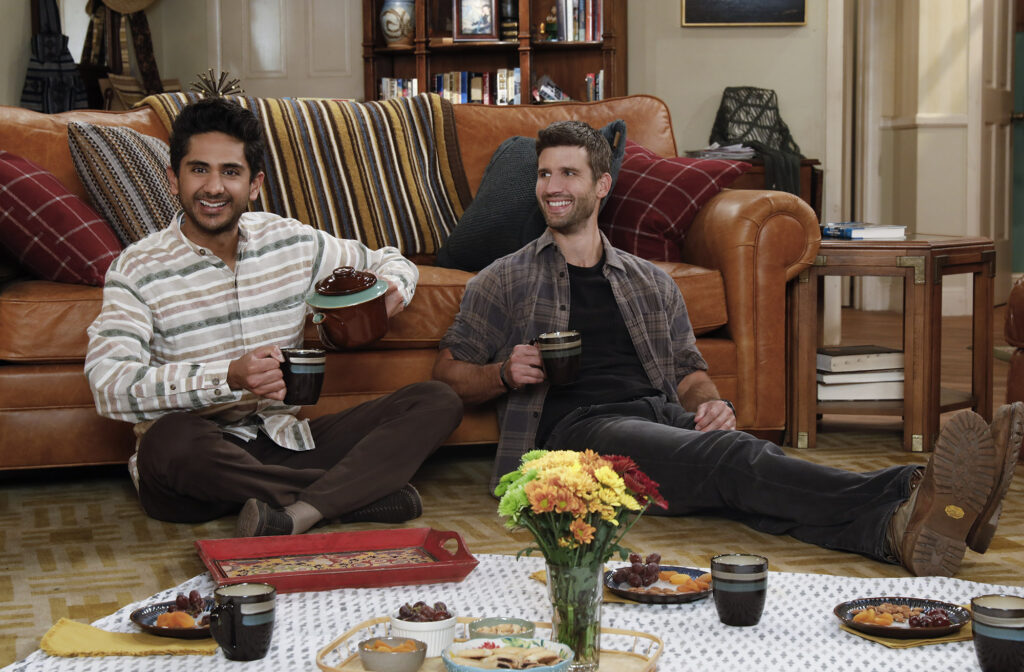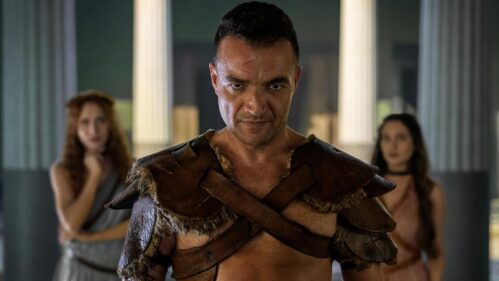The state of Middle Eastern representation on TV and in movies is dire, and “United States of Al,” which premieres April 1 on CBS, is not going to help. On the one hand, a character like Adhir Kalyan’s Awalmir, or Al, is theoretically “good” representation: the sitcom from Chuck Lorre, David Goetsch, and Maria Ferrari tells us he’s a hero, over and over again, because he saved the life of U.S. Marine Riley (Parker Young) while they served together in the Helmand Province in Afghanistan during the still-ongoing war. He served as an interpreter to aid the Americans, and fought the Taliban, and is polite and deferential, and respects his elders and women. And he is, in every moment he is onscreen, treated like a joke.
Al’s personality is an array of cliches about the Afghan people and Muslim ideology. His affect is one of nonthreatening, effete sexlessness, all flailing hands and huffy offense. He goes by a Westernized nickname, and laughs off when people fail at pronouncing his name (“Mr. Aw-wawa”). He makes jokes about American imperialism, which “United States of Al” winks away with a laugh track after each one liner (excuse me if I don’t find the deaths of tens of thousands of Afghan civilians after the U.S. invasion in 2001 that amusing). Much like the early days of the Raj Koothrappali character on “The Big Bang Theory,” Al is struck silent by women’s bare legs and their exposed cleavage in bikini tops; if there ‘s one thing Lorre is consistent about in his comedies, it’s portraying brown men as simultaneously horrified and enthralled by white women.
In the series’ first four episodes provided for review (the pilot, “Shorts/Neykar,” “Repair/Tarmin,” and “Spinach/Sabzi”; each episode’s name is provided in both English and Pashto, one of Afghanistan’s two official languages), Al is never given any mission, purpose, or motivation past being Riley’s sidekick. Helping Riley get over his trauma. Helping Riley reunite with his estranged wife Vanessa (Kelli Goss). Helping Riley improve his relationships with his daughter Hazel (Farrah Mackenzie), father Art (Dean Norris), and sister Lizzie (Elizabeth Alderfer). Al is accommodating, helpful, and utterly devoid of identity.

Yes, there are four writers of Afghan descent in the series’ writers’ room; the episode “Shorts/Neykar,” for example, has a story credit by Habib Zahori, a former war journalist. That shocked-into-silence moment, in which Al freezes up during a driving exam when he sees his instructor wearing sensible knee-length Bermudas, was inspired by Zahori’s own experience at the University of Oklahoma as a Fulbright fellow. “Jean shorts. I almost had a heart attack. I had never seen women’s legs!” Zahori told the New Yorker. Maybe it’s a story that’s funnier in person. In sitcom format, it’s eye-rollingly trite, the exact kind of “Brown people, they’re so backward!” humor that isn’t only offensive, it’s also blunt and outdated.
If the intent of “United States of Al” is to point out the contrasts and complexities of Afghan culture, and explore the fish-out-of-water strangeness of Al making a new life in Ohio, it needs to dig a little deeper. (And perhaps should have started with casting an Afghan actor as Al, rather than the Indian South African Kalyan.) Nothing about these first four episodes, though, suggests a willingness to move past the predictable pork/alcohol/sex jokes and into grappling with how a Middle Eastern and Muslim immigrant who spent years surrounded by war would adjust to American life. This series is called “United States of Al,” but the family who houses him are the real main characters. We see how the death of Lizzie’s fiancé in Afghanistan affected her, shifting her from a high-achieving student with a full ride to New York University to study art to a woman who spends her nights drinking and in strangers’ beds. We see how Riley’s tours affected him: his inability to hold down a job, his inability to stay loyal to his wife, his inability to deal with his ongoing purposelessness.
But Al? The guy actually from Afghanistan, a country whose decades-long relationship with the United States has been one of corruption, mistreatment, and violence? Al seems perfectly fine, so utterly unfazed by his new life that the show almost seems to be suggesting war is a kind of natural state for the Middle East, and therefore easy to brush off and move past for people from that region. (Tell that to the millions displaced by the U.S. War on Terror, the collapse of Iraq, increased drone warfare under the Obama administration, and the Syrian Civil War.) At one point, Riley affectionately calls him a “clown,” and that’s exactly what this show makes Al. If the intent of “United States of Al” is to make Afghan people “nonthreatening” and to make the people who watch CBS sitcoms “tolerant,” I suppose this is one very grueling way to go about it. But so far, the extent of Al’s usefulness in the show ostensibly named after him is to function as something to laugh at, rather than someone.

“United States of Al” begins by reuniting Riley and Al, who served for six years together in Afghanistan. It took Riley three years to strong-arm the U.S. government into signing Al’s Visa paperwork (federal foot dragging that put countless interpreters in danger during the Trump presidency and is still continuing now, under Biden), and now Al has arrived in Ohio to live with Riley’s family. (The fact that this show doesn’t do an “Al got detained at the airport” subplot is simultaneously a relief and also feels like a side stepping of a real issue that affects tons of Middle Eastern people traveling to this country!) Al is shocked to learn that Riley and his wife Vanessa are separated, and immediately volunteers to help them get back together, even if they’re both unwilling to do so. He also thinks Riley is too lax of a parent for Hazel (she won’t eat spinach, oh no!) and too disobedient of a son to Art (Riley doesn’t do chores in a timely fashion, oh no!); crazy how Afghan culture rigidly enforces generational piety, right?
Other moments the show presents as goofy hijinks, but that are actually instances in which the show others Al or his family. He barters at the grocery store instead of paying the specified price; how wacky! He double kisses everyone, even other men, on the cheeks; how strange! His mother, who appears on video chat in a headscarf (whether a mother would wear a headscarf around her own son is up to debate, but I lean toward no), doesn’t understand why he’s wearing shorts; how silly! “There’s no way God will accept your prayers wearing that thing,” she sniffs, but if you expected anything further about Al’s childhood, or why he decided to become an interpreter, or how his French (which he speaks with Vanessa) got so good, or what his family thought about him helping the Americans, or what he hopes to do now in the U.S., or if he is interested in meeting any other Afghan expats, “United States of Al” isn’t interested in any of that quite yet. And maybe not ever!
As Roger Ebert himself said about cinema, the point of so much pop culture is to build empathy, and to help us understand life from a different perspective. But where is this show’s empathy for Al? He’s not enough of a character yet to generate any feelings at all. Instead, “United States of Al” is working to ensure our gratitude toward the courageous Riley, our tenderness for the wayward Lizzie, our sympathy for the discontent Vanessa, our appreciation for the gruff Art, our warmth toward the sassy Hazel. But all this show can generate for Al is to call him an “optimistic little dude,” and that patronizing pat on the head is pretty much the whole vibe of the arduous “United States of Al.”
Four episodes screened for review.












